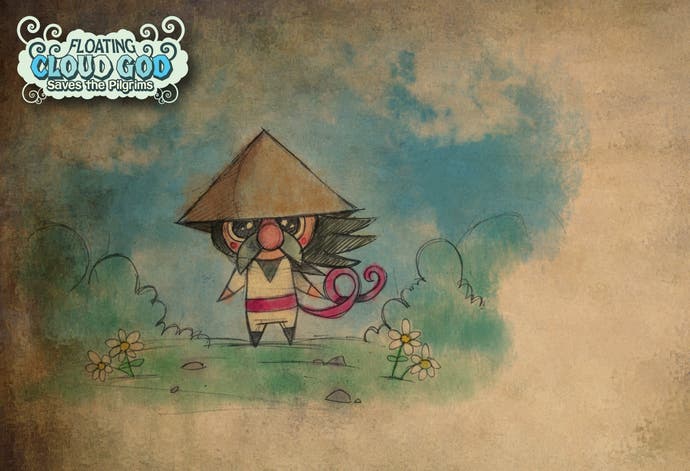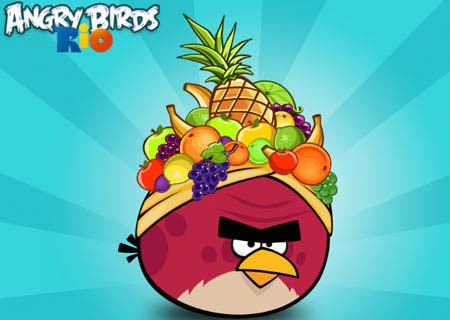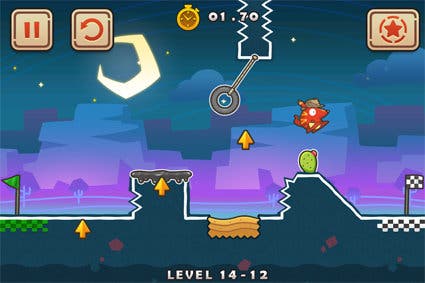Trends of 2012: Handheld Gaming
Things are exciting, frightening, and confusing.
2012 is going to be a fascinating year as far as handhelds are concerned. iOS continues to screw with the marketplace, for one thing, helping to democratise development while also redefining how much audiences expect to pay for a game. Meanwhile, the 3DS appears to have finally hit its stride - or has it? - and Sony's getting in on the action with the almost implausibly lavish Vita. Is there still enough room for everybody?
If this article seems more preoccupied with a single issue than the rest of Eurogamer's trends pieces, I suspect it's because the handheld industry is similarly preoccupied. Weird as this would have sounded five years back, Nintendo and Sony feel like the underdogs in this brave new-ish world of Apps and freemium releases. That leads us to some interesting questions.
Is there still a place for the bespoke handheld console that allows developers to take a risk on big-budget projects that sell for £30? Will the increasing clutter of the App Store begin to deter teams from putting all their chips on iOS? Will Solipskier ever run properly on the ultra-cheap HTC Wildfire S that I really shouldn't have bought when I lost my iPhone? Will Dale Cooper escape from the Black Lodge and sort things out with Heather Graham?
I haven't got a clue, which is why I've spent the last few weeks firing off emails to some of the smartest people in handheld gaming and asking what they think. Here's what I found out. (Spoiler: Coop isn't going anywhere.)
The only constant is change
Heraclitus said that, shortly after his match-three variant Greek Balls of Fire failed to chart on the iPhone Top 50. Most of the people I've been speaking with seemed to agree with him: this is a seismic period for the industry. But is it exciting seismic, like a kegger party in an earthquake testing lab, or is it frightening seismic, like a 9.3 that leaves you trapped and bleeding under a heavy refrigerator while your Alsatian decides that you're already dead and begins eating your feet?
"It is more than exciting," says Giordano Contestabile, PopCap's franchise business director for Bejeweled, when I ask him about the proliferation of handhelds. "It's reshaping the whole industry, and making it much bigger! If we assume that 'handhelds' include any portable gaming device, including smartphones and tablets, we are now looking at an addressable audience of more than 500 million potential players, many of whom weren't playing games before. Additionally, most of those devices are connected, opening the possibility of cross-platform, social and online gaming, therefore leading to an explosion of innovation and opportunities."

He's a fan, then. Matt Bozon, the creative director of WayForward Technologies, shares his enthusiasm, but also sounds a note of caution. "Handheld games on average are becoming much more expensive and time-consuming to create, requiring much higher resolution visuals and larger teams all around," he tells me. "This could send a lot of smaller devs towards iOS, and force experienced console devs into unfamiliar handheld territory."
Rhodri Broadbent, the founder of Dakko Dakko, which created the wonderful PSP Mini The 2D Adventures of Rotating Octopus Character and is now hard at work on a 2012 follow-up called Floating Cloud God Saves The Pilgrims, is more excited by the positive effects of all this competition. "My biggest hope is definitely that a healthy rivalry between Vita and 3DS excites the entire handheld industry," he says. "I'd really like to see more developers who might have hitherto chosen to focus on 'bigger' experiences on home consoles try their hands at handheld game development.
"Now that portable gaming tech is significantly less restrictive (performance-wise) than ever before, I see huge potential for developers to play on the more personal, intimate experience of having the whole game system in your hands wherever you are. Handhelds have for a long time been viewed as for the kids to play on the back seat on long journeys, as 'throwaway', but I think that is to hugely undervalue what portability, accessibility and local wireless play with individual screens can bring to the gaming experience."
Vita and 3DS
Let's try and get a little more specific now. Nintendo and Sony both have new hardware in the marketplace. In both cases, they've opted to ignore Apple's approach, focussing primarily on games and controlling the sales channels.
Despite a slightly wonky launch in Japan, Vita remains an unknown quantity. Anecdotally, everyone I've spoken to who has played around with one ends up very excited about it, but there are lingering questions over whether audiences are going to pay £40 for games when they have recently been led to believe that sort of thing should only cost 69p.
Paul Rustchynsky, game director for Motorstom RC, appreciates Vita's clarity of purpose. "As a gamer it's so exciting that PS Vita is first and foremost a contemporary gaming device," he says, before singling out that second analogue stick for particular praise. "This is massively important due to that near-parity with the PS3. As you'll see with MotorStorm RC, it gives us a virtually identical experience between the two platforms. It also allows developers to bring a wider range of game experiences to the handheld platform. Typically FPSs have been unwieldy on handhelds but with the PS Vita you'll be able to play the sort of shooters you'd expect to play on your PS3."

"Mobile gaming has changed hugely in the past few years, and it's going to take a little time for this to settle down," admits Stuart Tilley, the game director for WipEout 2048. "With the arrival of Vita, this is going to change that landscape again. Smartphones do some really cool stuff, but they're often smaller-scope games designed to work with a touch-based control scheme. They perhaps aren't as great at the types of games we all grew up playing with a DualShock controller. We think smartphone games will continue to thrive over the coming year, but with Vita offering larger-scope, high production value games like WipEout 2048 for games on the go, complimented with smaller-scope games from PlayStation Minis."
Broadbent cites the machine's embarrassment of input riches as a source of potential creativity. "I am massively enthused for Vita and am looking forward to making games for it very soon," he tells me. "It opens up many possibilities not just on a technical level. The toybox of input opportunities means that there are new creative avenues to peer down.
"This new generation of portables reminds me of one of the single most enjoyable times of my career thus far; shortly after I joined Q-Games (just before the launch of the Nintendo DS) I was working with a designer there on a variety of new control schemes for the then-untitled StarFox DS game. So many new and different ideas came simply out of having a touch screen and stylus to play with. Implementing them, testing them all out, and seeing our producer's face when he tried a new idea was massively exciting and rewarding work. I very much look forward to similar experimental periods on Vita. And the screen is so very pretty."
While we're in a positive mood, James Mielke, a producer at Q Entertainment - the studio's currently readying Lumines: Electronic Symphony for release on Sony's new handheld - thinks he may have spotted a star in Vita's European launch line-up. "I have to say that Gravity Rush is brilliant," he says. "It reminds me of a Moebius comic book come to life, and the gravity mechanic is wonderful. To me it's the Super Mario 64 of the system. It really shows what the Vita can do.
"As for the rest of the year, I'm hoping we see more PS3-to-Vita type simultaneous releases that speak to each other. By that I mean I want to see games like Skyrim or Dark Souls, where I can play on my PS3, continue on my Vita, and then resume again on my PS3, with my progress saved in a cloud."

With great processing power, though, comes great responsibility - and that counts for both Sony and Nintendo's machines, apparently. Bozon: "Speaking to 3DS and Vita, the AAA games in the industry hopper appear to be console experiences reborn, shrunk down, or simplified onto handhelds. That's cool, but hopefully they will still find a way to cater to a handheld gamer's unique tastes. Handheld gaming is special, and it would be a shame to see a blurry line between a living room experience and one designed to be taken on-the-go. I don't want to see handheld gaming viewed as the 'lesser' living room experience. For many years handheld gaming has been as unique and fun-loving as its audience. I'm hoping it doesn't become bogged down, or too expensive to experiment and create imaginative and spontaneous kinds of games."
Contestabile's on the fence. "As a gamer, I'm excited about some of the titles announced for those platforms, in particular in 'core' genres that are particularly suited to controls optimized for gaming. From a business perspective, it will depend on how progressive platform holders will be, and how flexible in adapting to a rapidly changing landscape, in particular in terms of allowing players to connect with online and social platforms and to engage in cross-platform gaming. The higher barrier to entry in terms of developing and publishing games on those platforms, while guaranteeing a higher average quality bar, will eventually be a disadvantage when compared with the wealth of choice offered by smartphones.
"Until recently, it was possible to see the handheld market bifurcating, with 'core' games finding a home in dedicated devices and 'casual' games dominating the screens of smartphones and tablets," he continues. "However, the increasingly powerful hardware specs of mobile devices have made it possible to reach success on smartphones also with games that are aimed at an enthusiast audience. In that sense, mobile phones are further invading the traditional space of dedicated handheld gaming devices.
"On the other side, we're seeing an increasing number of younger gamers, historically a strong segment for handhelds, being lured by the appeal of portable devices such as iPod Touch. My view is that dedicated gaming handhelds are going to become more and more a niche platform, aimed at an enthusiast audience and at specific game genres."
Burn. So is there still a big enough audience to support a platform the Vita? It's a question Nintendo must also be asking of the 3DS.
"Obviously Nintendo has built a lot of momentum with the 3DS, so that will be interesting to watch," says Mielke. "There are still a lot of challenges for Nintendo platforms, though. For example, tons of people bought the 3DS because of the price drop and Monster Hunter (in Japan), but can other non-Nintendo games succeed on the platform? It's something we think about a lot."
Smartphones
If Vita and 3DS seem like something of a gamble, it's because of one thing: the rise of smartphones and tablets. "As of now, iOS is by far the fastest growing and most efficient handheld game distribution platform," says Contestabile, "and it's one of the best things that ever happened to the game business." Get a room, dude. "That said, I think developers would benefit from having several strong platforms with a definite identity and a large addressable user base. As such, I hope that Android will mature and become less fragmented and that Windows Mobile will achieve a larger usage footprint. I also hope that Sony and Nintendo will make bolder steps into the new world of connected and social gaming, opening up their ecosystems further."
Are there any dangers here, though? "Smartphones continue to grow and take over the market share once dominated by regular mobile phones, and of course the gaming market as well," says Mielke. "As a result, being able to create more games, more cheaply, remains a compelling formula. The problem is that so many companies are swarming towards the social and mobile gaming markets that it has become that much harder to stand out in the field. We need to innovate and create new ways of gaming if we hope to compete with social gaming giants. I just hope that true innovation doesn't get buried under the avalanche of Zynga and Evony clones flooding the market."
"The App Store feels like a gold rush right now," agrees Scribblenauts developer 5th Cell's Jeremiah Slaczka. "I heard that there are close to 175 games released per day. And that is just games, not apps. Obviously, most of those are probably not very good and won't be particularly successful. With that in mind, even if there is a mad rush to churn out games for mobile devices, there is still a lot of maturation needed, in terms of quality of the market."

5th Cell is in an excellent position to compare smartphone and boxed handheld development. The team had a huge hit with Scribblenauts on iOS, but it initially developed the game for DS - a platform for which they could presumably afford to spend more money on production, because they could expect to sell the finished product for £30. Is the increasingly standard 69p price point of iOS putting a certain kind of game out of reach for most developers?
"I'm pretty sure Infinity Blade cost more to make than the original Scribblenauts did," answers Slaczka. "There are different tiers of iOS titles; smaller companies can aim for smaller, niche markets, while the bigger developers must focus on the top tier if they want to make sustainable revenue. Developers should always approach the platform they are releasing on with a very specific strategy. Like everything in life, one size does not fit all."
That may be the heart of it, actually: the handheld market in 2012 is going to be a fragmented one. That means audiences are going to need to know where to look to find the things they're after, and developers are going to need to know how to target their games more effectively.
Perhaps, though, this fragmentation isn't quite as new as it seems. I'm going to leave the last word to Broadbent, who spent much of the last decade living and working in Japan. "At the time of the DS boom, Japanese feature phones were already highly sophisticated communication devices, many able to pick up broadcast TV for free, and all of them the primary means of e-mail for their owner," he says. "The competition for a user's time was therefore just as strong then as it is now, and yet the DS became a social phenomenon against that backdrop. Similarly the PSP has seen huge sales in Japan over the past few years with Monster Hunter Portable becoming fiercely popular, again all alongside the dawn of the smartphone, but also alongside the already entrenched and still much more common feature phone.
"If the content is compelling, I see no reason why players would now stop seeking out dedicated games hardware. And as with Brain Training or Monster Hunter, it only takes for the right software to come along, and the rising tide lifts all ships. I'm therefore very confident that the dedicated handheld will not only survive, but continue to thrive irrespective of the spread of smartphones/iOS devices and the much touted loss of 'casual gamers'.
"Perhaps there is a rebalancing going on, where the huge swell of users in the DS boom years shakes out and some don't see the value in a dedicated platform any more - but frankly if they bought their system for Nintendogs, Brain Training or My Dolphin, I was never likely to be able to sell them The 2D Adventures of Rotating Octopus Character, nor were they likely to pick up many of the most successful portable games from the past 25 years. The market that I am addressing is still there, with new gamers every year, and our access to that market via digital distribution continues to improve."









